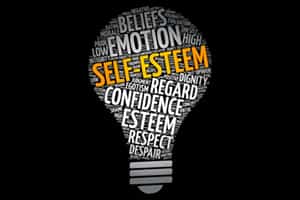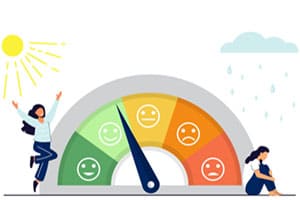Life-Stuff.org
Facts & advice foryoung adults

“My self esteem has almost disappeared…. I don’t know how to interact with people anymore and find it hard to enjoy the things that I like.”

Self-esteem is based on our opinions and beliefs about ourselves, which can sometimes feel really difficult to change.
Your self-esteem can affect whether you:

The things that affect our self-esteem differ for everyone. Difficult or stressful life experiences can often be a factor.
Causes include:
You might have had some of these experiences, and you might also have had difficulties that aren’t listed here. Or there might not be one particular cause. It might feel as if changing your feelings about yourself will be difficult, but there are lots of things you can try to improve feelings of self-worth bit by bit (See Steps to better wellbeing)
Some of the experiences of low self-esteem can be signs of a mental health problem, particularly if they last for a long time or affect your day-to-day life. For example:
Having a mental health problem can also cause you to have low self-esteem, and it might feel harder to cope or take steps to improve how you feel.
Having low self-esteem can lead to someone feeling more anxious and insecure. So doing anything to boost it and feel better and more confident can really help.

Get to know yourself – for example what makes you happy and what you value in life. Some people say they find it helpful to write a diary.

Consider what self-esteem means to you. You might realise you’re basing your sense of self-worth on things that aren’t useful or helpful for you. So it could be about being kind and listening rather than being cool and popular.

Avoid comparing yourself to others. Try to remember that what other people choose to share about their lives isn’t the full picture and isn’t realistic.

Say positive things to yourself. It might feel really strange at first, but you’ll feel more comfortable the more you do it.

Let yourself have feelings. It’s normal to feel a wide range of emotions from sad and tearful, emotional, grumpy – or happy and cheerful.

Try to challenge unkind thoughts about yourself. You might automatically put yourself down. If you find yourself doing this, it can help to ask: “Would I talk to, or think about, a friend in this way?”

Celebrate your successes. No matter how small they may seem, take time to praise yourself and notice what you did well. It could also help to remember past successes.

Accept compliments. You could make a note of them to look over when you’re feeling low or doubting yourself.
Symptoms of an eating disorder include worrying about weight, eating too little or someone making themselves sick after eating. Symptoms can creep up people, they may become secretive, hide food, pretend to have eaten for example. It is essential to get help – maybe start by confiding in family or friends or arrange to see a GP.

Symptoms of eating disorders can include:

Helplines are open 365 days a year from 9am–midnight during the week, and 4pm–midnight on weekends and bank holidays. You can also talk in confidence to an adviser from eating disorders charity Beat by calling their adult helpline on 0808 801 0677 or youth helpline (under 18) on 0808 801 0711. They also offer one-to-one web chat.

National Centre for Eating Disorders
For more information on eating disorders and treatment. They also have a support Line (UK): 0845 838 2040
Read next Steps to better wellbeing